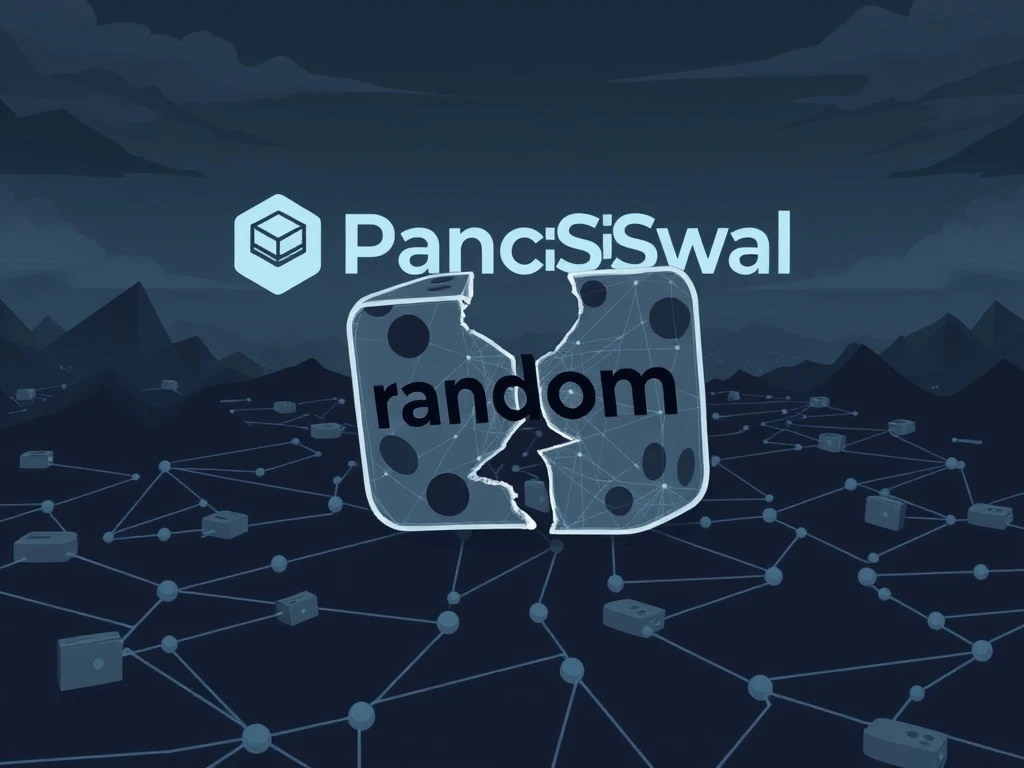Shocking: PancakeSwap’s Crypto Trading Competition Winners Linked

A recent investigation has uncovered troubling patterns within PancakeSwap’s supposed ‘random’ prize distribution. This revelation casts a shadow over the fairness of its high-stakes crypto trading competition. For many in the decentralized finance (DeFi) space, transparency is paramount. However, blockchain records now suggest a significant portion of winners were not chosen by chance. This raises serious questions about integrity and trust in one of the BNB Chain’s leading platforms.
Unveiling the PancakeSwap Controversy
PancakeSwap, a prominent decentralized exchange (DEX) on the BNB Chain, recently concluded its second trading competition. This event promised random rewards to participants. Yet, an exclusive investigation by Crypto News Insights reveals a different story. Over half of the 1,700 winning wallets show clear signs of being connected. This suggests a coordinated effort rather than genuine random selection. The findings point to a potential manipulation of the prize distribution.
The competition aimed to reward investors for trading sponsor tokens. These tokens came from five projects within the Binance Alpha program. They included League of Traders (LOT), Bedrock DAO (BR), MilkyWay (MILK), NodeOps (NODE), and Moonveil (MORE). Participants accumulated points by trading these tokens directly on PancakeSwap. This platform is known as the top DEX by total value locked on the BNB Chain. PancakeSwap explicitly stated that winners meeting specific trading volume thresholds would enter a “random lucky draw.”
The Mechanics of the Trading Competition
The second PancakeSwap trading competition ran from July 7 to August 5. Its structure incentivized high trading volumes. Each of the five Binance Alpha projects contributed $50,000. This created a substantial $250,000 prize pool. Binance Alpha gives investors early access to pre-listed tokens. Therefore, the collaboration seemed beneficial for all parties involved.
Participants simply needed to accumulate trading volume for the sponsor tokens. The prize pool was divided into three tiers: $2,000, $5,000, and $10,000. A single participant could enter the draw for all five tokens. However, they could not win for the same token more than once. This set a maximum possible reward of $2,500 for one wallet. The competition initially had a shorter schedule. It was then extended from July 27 to August 5, allowing more time for trading activity.
Blockchain Evidence Points to Wash Trading
Despite claims of random selection, blockchain records tell a different tale. Crypto News Insights discovered at least 850 winning wallets were funded by other winning wallets. These wallets transferred BNB, the native cryptocurrency of the BNB Chain. This BNB was then used to engage in suspicious trading activities. The process involved repeatedly buying and selling sponsor tokens to artificially inflate trading volume. This practice is commonly known as wash trading.
A League of Traders representative expressed strong concerns. “The wallets were directly connected to each other, and they were getting picked. The chance of that happening consecutively is close to zero,” they stated. They further added that prizes “were not distributed fairly.” This suggests the winners were “hand-picked” rather than randomly drawn. PancakeSwap did not respond to requests for comment on these serious allegations. Other sponsors also remained silent before publication.
One clear example involves wallet 0x521…3E670, a tier three LOT winner. This wallet received 21,730 LOT tokens on August 7. Its activity log shows repeated LOT/WBNB trades on July 24. Once the trading threshold was met, the tokens were converted back to BNB. This BNB was then passed to another eventual winner. This wallet financed its wash trades with approximately $2,130 (2.7 BNB at the time). Less than a minute before these circular trades, it received BNB from another tier three winner, 0x463…5d040 (MORE). The same pattern of funding and passing BNB was observed in the MORE winner’s wallet. This intricate network links over half of the winning wallets.
Implications for BNB Chain and Decentralized Exchanges
The controversy highlights significant concerns about transparency within the DeFi ecosystem. Especially on the BNB Chain, where PancakeSwap holds a central position. Projects like League of Traders invested tens of thousands of dollars to sponsor the competition. They expected fair play and legitimate engagement. This alleged manipulation undermines trust in such initiatives. It also questions the integrity of prize distributions on major decentralized platforms.
As a leading decentralized exchange, PancakeSwap plays a crucial role in the BNB ecosystem. Its reputation for fairness is vital for maintaining user confidence. The implications extend beyond this single competition. If a prominent DEX cannot ensure genuine random selection, it could deter future participation. It might also lead to increased scrutiny of similar promotions across the DeFi space. The incident underscores the need for robust verification mechanisms.
Calls for Greater Transparency and Accountability
The lack of response from PancakeSwap and other sponsors is concerning. It leaves many questions unanswered regarding the fairness of the competition. The ongoing allegations of clustered winners and wash trading demand a thorough explanation. Such transparency is crucial for the continued growth and credibility of decentralized finance. The community expects clear communication and accountability from platform operators.
PancakeSwap recently concluded its third trading competition. This latest event featured six tokens and a $300,000 reward pool. It announced on X that “2,040 random lucky winners have been rewarded.” Furthermore, PancakeSwap indicated that the next competition is “coming soon.” Given the recent findings, many will undoubtedly monitor these future events with heightened skepticism. The crypto community requires assurances that all participants have an equal and truly random chance to win. Fair practices are essential for building a sustainable and trustworthy decentralized future.







